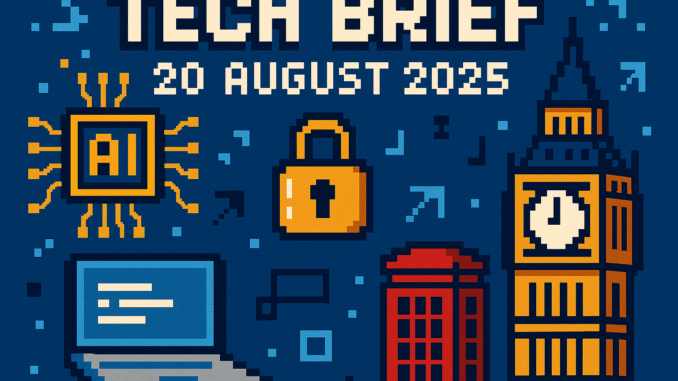
“A culture can be judged by the stories its technology tells.” Tech Brief 20 August 2025 offers that unsettling reminder with today’s highlights: an iconic British AI institution in crisis, a diplomatic climbdown over digital privacy, and new warnings as deepfake scammers target beloved names. If you missed yesterday’s Tech Brief, catch up here before diving in.
Turing Institute Faces Turmoil as Staff Reject Security Shift
‘Shut it down and start again’: staff disquiet as Alan Turing Institute faces identity crisis
“Just turn it off and back on again.” That phrase drifts from home computer rooms into the Alan Turing Institute boardroom, where scientists and researchers are fed up. The UK’s headline AI research centre, named in honour of the country’s computing pioneer, is under pressure. Ministers want research focused on national security and defence, not open discovery.
The original mission, shaped in 2015, aimed for curiosity and open collaboration. Staff now say the Institute risks losing its soul, drifting towards closed-door work and militarised priorities. Such a shift feels all too familiar for readers who have seen beloved spaces rebranded for funding, leaving practical ideals behind.
The debate flickers with Turing’s own legacy, creative, nonconformist, endlessly curious, straining under the weight of government targets. What gets sacrificed when institutions chase power over principle? In this case, the answer looks uncomfortably like everything.
UK Withdraws Demand for Backdoor to US Apple Data
UK has backed down on demand to access US Apple user data, spy chief says
The UK government has quietly dropped its request for “backdoor” access to Apple user data held in the United States. US intelligence officials confirmed the decision, ending a prolonged and sometimes awkward diplomatic row. Britain stands down, America locks the vault.
Encryption, a method of protecting data by turning it into unreadable code, has always spurred controversy. Governments claim security needs, but tech companies and users worry about privacy. The 1990s had Clipper chip debates and PGP key swaps; today, control is even further out of reach for national governments.
This climbdown matches an old pattern. As institutions narrow their purpose for political gain (see the Turing Institute above), individual rights to privacy can slip through the gaps. Who actually gets to lock the digital door?
Deepfake Scams Target Billy Connolly’s Legacy
Deepfake AI scammers target the Big Yin
Billy Connolly, Scotland’s most beloved comedian, has become the latest victim of AI-powered deepfake scams. Cyber criminals use generative artificial intelligence tools to simulate his voice and personality, tricking fans into believing fraudulent content. If you ever recorded TV specials onto VHS or swapped comedy tapes on a school bus, this one stings a little extra.
These scams are not just technical curiosities. They blur the line for genuine fans, turning trusted voices into tools for manipulation. Deepfake technology, which uses algorithms to realistically copy faces or voices, now enables fraud at a scale that analogue tricksters could only dream of.
Industry experts say extra caution is wise, so question that uncanny video or suspicious message. Our icons can be mimicked, but trust is far harder to fake. As trust fractures, the question is simple: What does digital authenticity mean when anyone’s voice can be hijacked?
From the Wayback Machine
On This Day: 1977, Voyager 2 was launched from Cape Canaveral, marking the start of its journey to explore the outer Solar System. Equipped with high-resolution cameras, magnetometers, and a 420-watt power source, Voyager 2 recorded first-ever flybys of Jupiter, Saturn, Uranus, and Neptune. Its signals, still returned from interstellar space, connect us to a milestone in planetary science and engineering.
Today’s Big Question
If the institutions we trust can be so easily redirected, and even the voices of our cultural legends can be faked, what defences remain? Tech Brief 20 August 2025 started with stories of power and identity. We end by asking what we’re prepared to lose or defend if the next generation is to inherit any real sense of digital history.
Switch something off tonight. Think about which stories, voices, and codes are worth saving for tomorrow, even if no computer ever quite forgets.
Missed yesterday’s Tech Brief? Catch up here

Leave a Reply